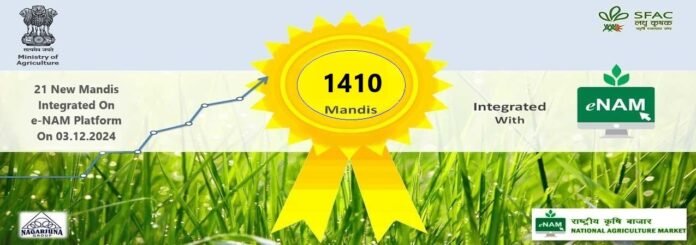New Delhi: As many as 1410 mandis of 23 States and four Union Territories (UTs) have been integrated with e-NAM platform by end of December 2024, the Minister of State for Agriculture & Farmers’ Welfare Ramnath Thakur said in Lok Sabha on Tuesday.
He said in a written reply that the Union Government is implementing National Agriculture Market (e-NAM), a virtual platform integrating physical wholesale mandis/ markets of different States/ Union Territories (UTs) to facilitate online trading of agricultural commodities through transparent price discovery method to enable farmers to realize better remunerative prices for their produce.
The Centre has approved the Digital Agriculture Mission on September2, 2024 with an outlay of Rs. 2817 crore and an amount of Rs. 54.972 crore has been allocated for the FY 2025-26, he informed.
However, funds are released to the States based on their proposals.
The Minister said that the Mission seeks to enable a robust digital agriculture ecosystem in the country for driving innovative farmer-centric digital solutions and making available timely and reliable crop-related information to all the farmers in the country.
It envisages the creation of Digital Public Infrastructure for Agriculture such as Agristack, Krishi Decision Support System, Comprehensive Soil Fertility & Profile Map and other IT initiatives undertaken by Central Government/State Governments. Agristack project is one of the major components of this Mission, which consists of three foundational registries or databases in the agriculture sector, i.e., the Farmers’ Registry, Geo-referenced village maps and the Crop Sown Registry, all created and maintained by the State Governments/ Union Territories.
The government is providing administrative and technical support to all the states for implementation of the mission, he said.
AgriStack provides comprehensive and useful data on farmers’ demographic details, land holdings, and crops sown, enabling farmers to digitally identify and authenticate them for accessing benefits and services such as credit, insurance, procurement etc.
It also enables state to design solutions that open access for farmers to the digital economy such as Purchase and Sell of Inputs and Produce online in a trustful manner.



























